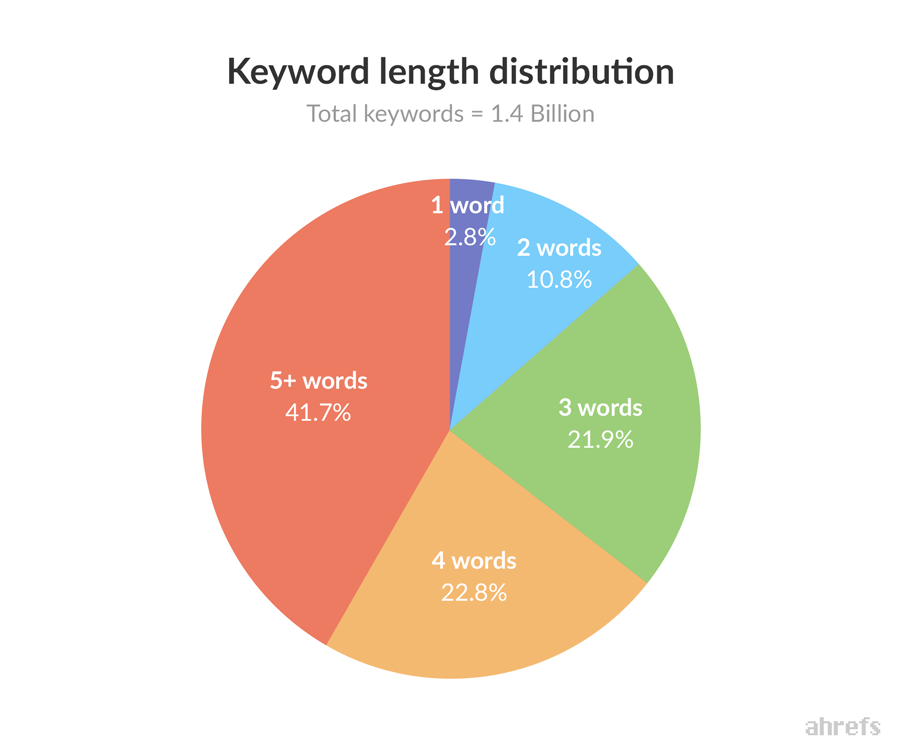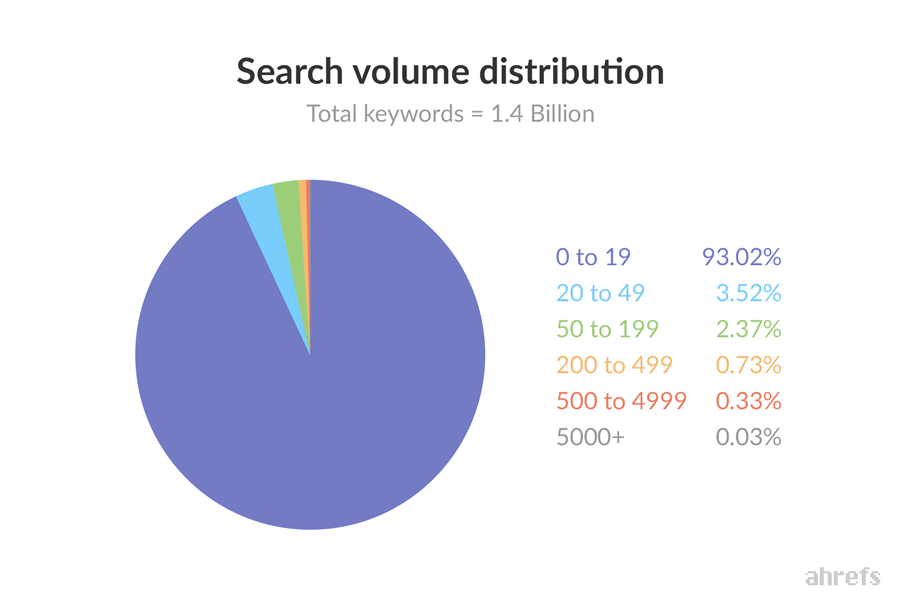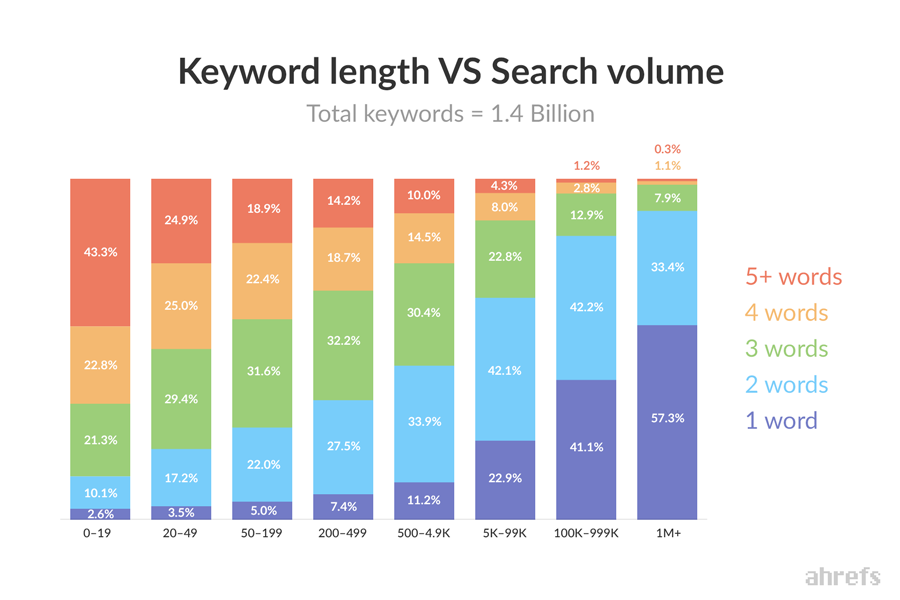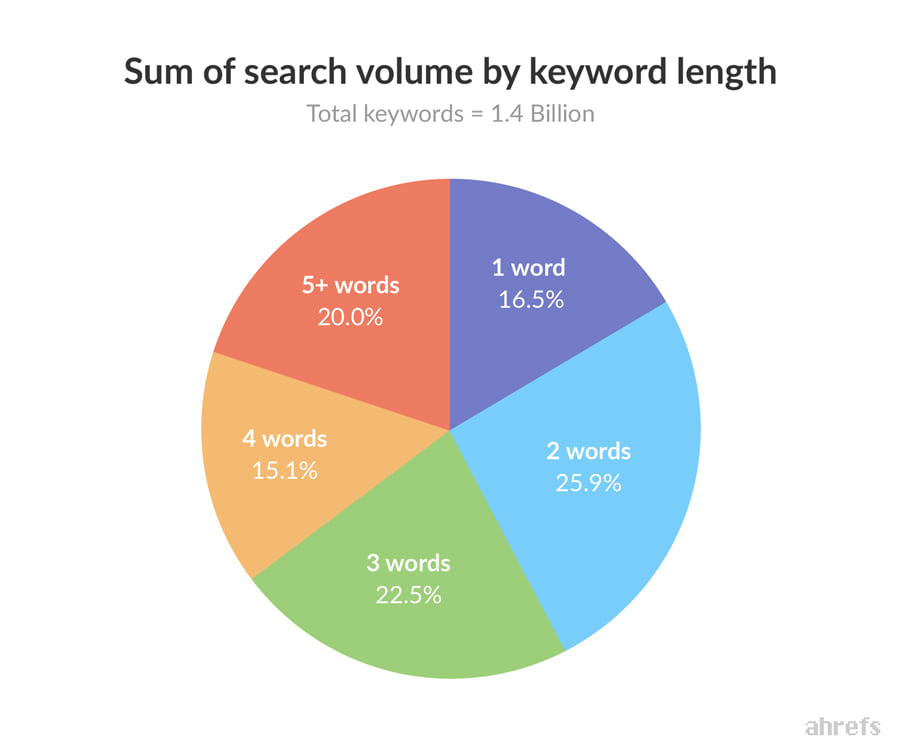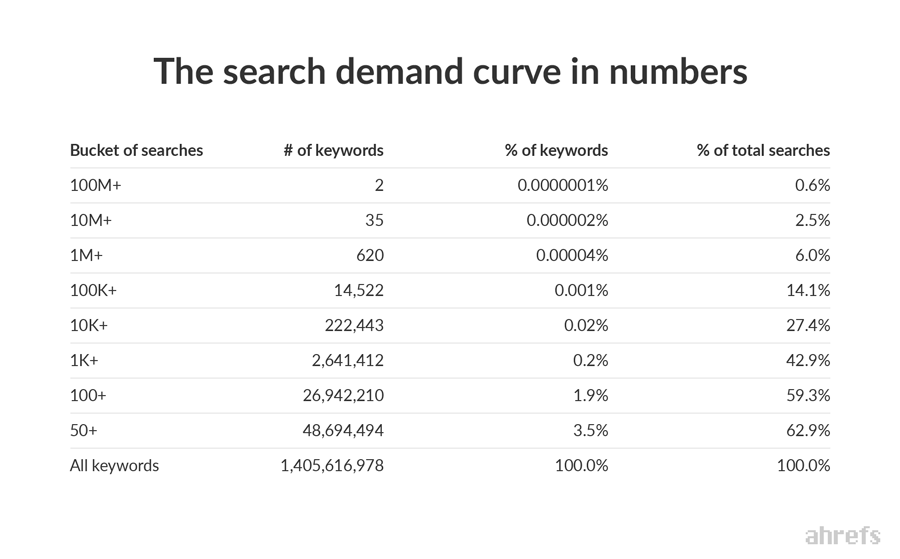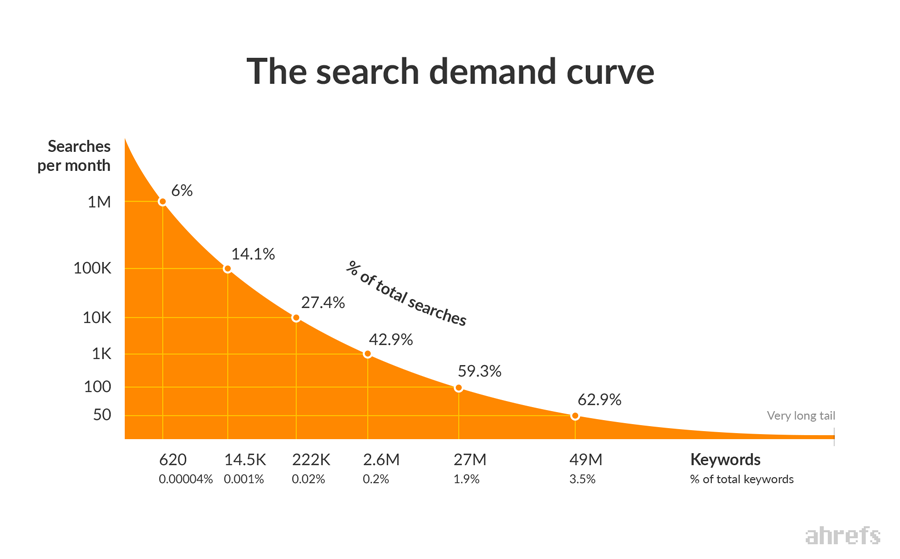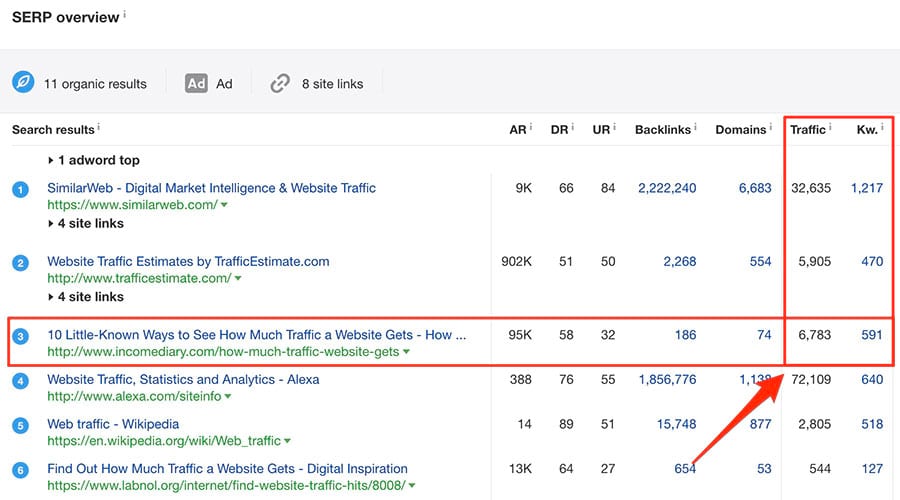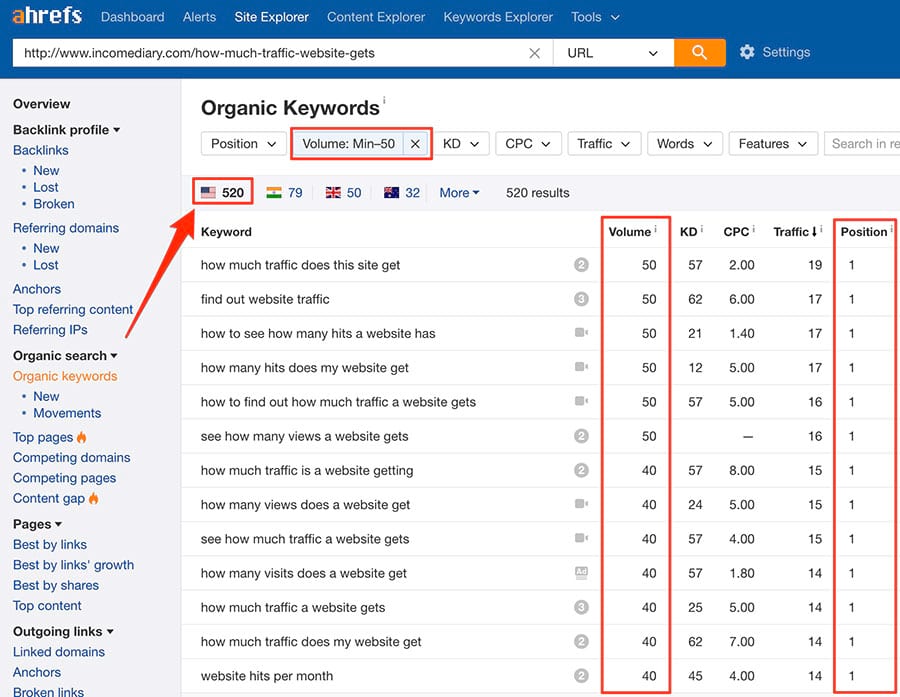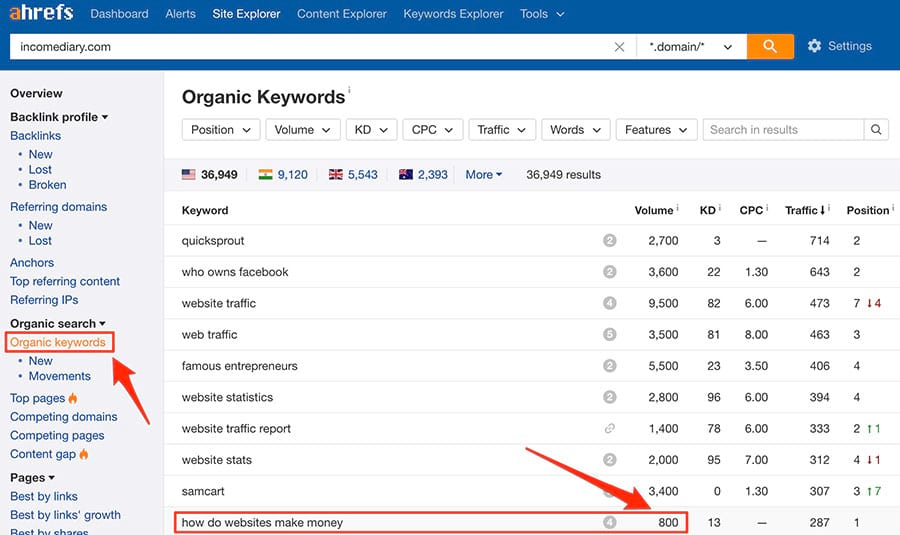What we learned about “Long Tail” by analyzing 1.4 Billion keywords
 | Tim Soulo Tim is the guy responsible for marketing and product development at Ahrefs. But most importantly he's the chief evangelist of the company. |
I'm sure you've heard it many times that short keywords tend to get tons of searches per month, while the long ones are never popular. But I don't recall any substantial research that didn't qualify their findings with vague words like "tend" or "rarely." So I pinged our data scientist on Slack and asked: - Do you think we could run a few queries on our ENTIRE keywords database (*that is 1.4 billion keywords for the United States), and not just a sample of a few million like we usually do? And he said, "Yes!" So today I'm happy to share a bunch of cool insights that we've got from studying 1.4 billion keywords. Distribution of keywords by lengthIt's generally assumed that the majority of Google searches have 3+ words in them. But what is the actual distribution of all searches by their length?
Pretty cool, right? One-word keywords account for only 2.8% of all the keywords people search for (in the United States). Distribution of keywords by monthly search volumeThe next thing we studied was the popularity of all keywords in our database. The following pie chart shows the distribution of all the keywords in our database by their average monthly search volume:
This is where you see the "long tail" start shaping itself. As it turns out, 96.54% of all search queries in the US have less than 50 searches per month. Keyword length vs Search volumeAfter we studied the length of keywords and their search volume, it was time to study the relation between the two. I was keen to learn how many one-word keywords had miserable search volume, and how many keywords with 5+ words were insanely popular. To study that, we distributed all keywords into 8 buckets by their monthly search volume and looked at the percentage of keywords of different lengths in each of these buckets:
Looks pretty nice, right? Clearly, there's a very strong correlation between the length of the keyword and its search volume (which was expected). But, at the same time, our data shows that "length in words" is not necessarily a prerequisite of a "long-tail keyword." 9.3% of keywords with a search volume over 1M have 3+ words. Here are some examples:
12.7% of keywords with a search volume of 0 to 19 have less than 2 words. Here are some examples:
(zipsnipcutter is a fun one, you should check it out) A lot of people define long-tail keywords as those that have 3+ words in them:
Well, as you can clearly see from the numbers and examples above, longer keywords are not necessarily less popular. Sidenote: We have already shared our concerns about these misleading definitions in our recent article: "Rethinking Long Tail Keywords: how to get TONS of traffic from ‘unpopular' search queries" But real data is always better than just an opinion, right? In fact, we also studied the "popularity" of each length group, by summing up the search volumes of all keywords in it. And got this:
So it looks like there's no specific length that would drastically outperform all others. The "Long Tail" of the "Search Demand Curve"The term "long-tail keywords" comes from the "long tail" of the so-called "search demand curve." In raw data from our 1.4 billion database, that search demand curve looks like this:
In the "head" of the curve, we have a few keywords with an extremely high search volume. But they hardly account for even 10% of all searches. Sidenote: In case you're wondering, those two 100M + keywords are "youtube" and "facebook." And at the "tail" of the curve, we have a monstrous pile of keywords with miserable search volume. But they account for almost 40% of all searches. To actually see this long tail on a graph, we need to plot all our keywords on the X-axis in the order of decreasing monthly search volume. The real graph wouldn't look very pretty because of its scale, so we've created a slightly modified visual representation instead:
How to take advantage of the long tailSo roughly around 40% of all searches are coming from billions of long-tail keywords that have less than 50 searches per month. There should be a way to use this to your advantage, right? Well, there is such a way! Look at this page, which ranks #3 for the keyword "website traffic":
The search volume of the keyword "website traffic" is almost 10,000 searches per month. So if you rank #3 for it, you can expect about 10% of that traffic at best, which is only 1,000 visitors per month. But Ahrefs' Keywords Explorer shows that this page is bringing almost 7,000 visitors per month. And this traffic is generated by nearly 600 keywords that it ranks for in organic search results. That is long-tail traffic in all its glory. Let's put the URL of this page in Site Explorer and see all these long-tail keywords that it ranks for:
It looks like people invent hundreds of peculiar ways to ask pretty much the same question. Google understands it and ranks exactly the same page for all these search queries. So by looking at the search volume of an individual keyword, you can't make a good prediction of the total search traffic potential of your page. You have to examine the top-ranking pages and see how much search traffic they are generating from long tail. The same principle applies to researching the keywords your competitors rank for. If you look at the best keywords that send traffic to IncomeDiary.com, you probably wouldn't pay attention to the keyword "how do websites make money" because it has only 800 searches per month:
But if you look at which pages send them the most traffic from search, you'll see this:
This page is bringing them a ton of highly targeted search traffic, all because of the numerous long-tail keywords it ranks for. Think long tailI'm pretty sure that most of the takeaways from our research didn't come as a surprise for you. They're quite intuitive, after all. But, at the same time, I see way too many people overlooking the power of long tail and focusing on search volumes of individual keywords (as if it's 2010). So let me know if you had an "AHA" moment while reading this post, and if you're now going to rethink your SEO strategy with long-tail keywords in mind.
|


